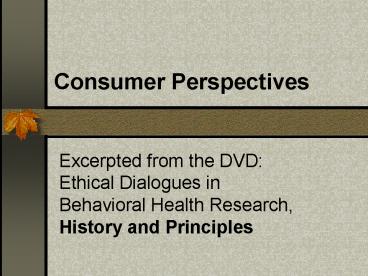Consumer Perspectives - PowerPoint PPT Presentation
1 / 20
Title:
Consumer Perspectives
Description:
studied whether electroshock and lobotomy would block drug-induced psychosis ... Little faith in drug research protocols. Discussion Group Participants ... – PowerPoint PPT presentation
Number of Views:41
Avg rating:3.0/5.0
Title: Consumer Perspectives
1
Consumer Perspectives
- Excerpted from the DVD Ethical Dialogues in
Behavioral Health Research, History and
Principles
2
Early History of BH Research
- Two stories to tell
- story of scientists with the power, the hubris
and the vision to explore human psychology for
the betterment of humanity - story of the disempowered, the lost and rejected,
the psychotic and the dysfunctional, who were
abandoned to the streets and institutions
3
Early History Neuroscientists
- Paul Broca worked with epileptics in Paris in the
1860s - Carl Wernicke probed the brains receptive
language center in Germany in the 1870s - Wilder Penefield 70 years later performed brain
surgeries under local anesthetic to draw a map of
bodily sensations - None were constrained from their work
4
Modern History Hoch
- Paul Hoch, Director of Research, New York State
Psychiatric Institute (1950s-1964) - gave LSD and mescaline to people with
schizophrenia to produce delusions and
hallucination in order to develop a model of
psychosis in humans - studied whether electroshock and lobotomy would
block drug-induced psychosis
5
Modern History Hoch
- Nobody questioned the ethics of such experiments
- Hoch was praised for his work and the exciting
possibilities of such experiments
6
Modern History Hoch
- APA National Convention (1950)
- Hoch told a packed audience how the research
subjects suffered intensely in these experiments - Justified this type of research as helping to
establish psychiatry as a solid fact-finding
discipline. - Such research was halted in the 1960s when the
federal government decreed that psychedelic
agents were dangerous and the NIMH discontinued
funding
7
Modern History Challenge Studies
- Symptom exacerbation experiments were accepted
practice (1960s-2000) - scientists tried making people with schizophrenia
worse through the use of sensory isolation, sleep
deprivation, and the administration of other
drugs that would produced profoundly disorganized
regressive states
8
Modern History Challenge Studies
- dopamine was administered to intensify psychotic
symptoms in first break patients coming into
emergency rooms and people who had recovered
sufficiently to be discharged. - even though patients were then given neuroleptics
to ease symptoms, some were still psychotic a
year later
9
Modern History Challenge Studies
- Veterans Administration Medical Center (1987)
- 28 people with schizophrenia abruptly withdrawn
from neuroleptic medication and injected with
L-dopa to discover who would fall into a relapse
the quickest - As atypical antipsychotic medications came to
market, researchers turned to new chemical agents
such as ketamine, the chemical cousin of angel
dust, to exacerbate symptoms
10
Criticism of Challenge Studies
- Advocates scientists criticize challenge study
protocols - Response People with schizophrenia volunteered
for these experiments - people have a right to make a contribution to
curing mental illness - stigmatizing to think that people with mental
illness cant weigh risks and decide
11
Criticism of Challenge Studies
- People were misled
- told that the experiments would make them sicker
- told that the experiments were to measure various
brain hormones or researchers were trying to tell
if regular medications were safe - risks were listed as increase in blood pressure
or upset stomach, but no side-effects were
anticipated at the doses administered
12
Modern History Research Participants
- Loss of trust
- Little faith in drug research protocols
13
Discussion Group Participants
- Misunderstood nature of past abuses and current
studies - Key Lessons
- Researchers need to do better in obtaining
informed consent so that participants understand
what is being done and not being done - Willingness to believe that people were being
injected with live HIV virus speaks to mistrust
of research community
14
Modern HistoryNew Wave of Reforms
- Media and senior government officials have given
serious attention to cases of ethical research
violations that have contributed to the deaths
of participants - Prestigious research programs have been
temporarily suspended - Accreditation of human subjects protections begun
15
Modern HistoryNew Wave of Reforms
- BH research has received much less attention
- Subtle forms of abuse still go largely
unrecognized - When asked about their personal research
experiences, discussion group responses were
mixed
16
Modern HistoryNew Wave of Reforms
- On May 16, 1997, President Clinton apologized to
the last surviving Tuskegee study participants
and families, the African-American community, and
the American people as a whole for the loss, for
the years of hurt. - Symbolic gesture
17
Modern HistoryNew Wave of Reforms
- Government convened a meeting at the CDC in
Atlanta, GA (1997) - 300 people of color, native Americans, and people
with mental illness and substance use problems - dialogue about how to rebuild trust in science
- Report to the President detailing the importance
of the meaningful inclusion of research
participants and their communities in the
research process
18
Modern History Research Participants
- First National Summit of Mental Health Consumers
and Survivors (August 25-29, 1999 in Portland,
Oregon) - Consumer/survivor research platform research
policy positions from the perspective of mental
health consumers - action plan research participant protections,
humane research, and participant inclusion in all
aspects of the research process
19
Modern History Research Participants
- Suicide of a young man participating in a drug
trial conducted by a California University
mobilized family members of people with mental
illness to question drug wash out protocols and
placebo trials
20
Collaboration of Scientists Research
Participants
- Mental health consumers who are researchers or
hold other roles in research organize local and
national efforts to educate and dialogue with the
scientific community - Growing numbers of researchers and policy-makers
have begun to value the collaboration of research
participants - Discussion Group
- Dont do anything to harm the people
- Touch of humanity goes a long way
- Show a little love to the researchee

